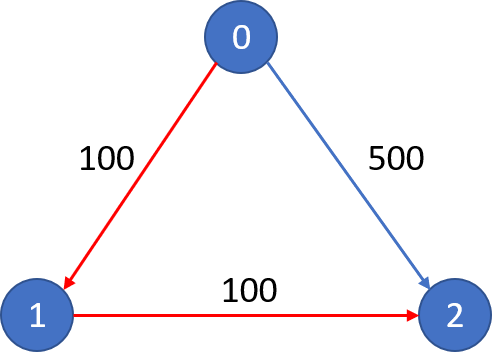There are
ncities connected bymflights. Each flight starts from cityuand arrives atvwith a pricew.Now given all the cities and flights, together with starting city
srcand the destinationdst, your task is to find the cheapest price fromsrctodstwith up tokstops. If there is no such route, output-1.Input: n = 3, edges = [[0,1,100],[1,2,100],[0,2,500]] src = 0, dst = 2, k = 1 Output: 200 Explanation: The graph looks like this:The cheapest price from city 0 to city 2 with at most 1 stop costs 200, as marked red in the picture.Input: n = 3, edges = [[0,1,100],[1,2,100],[0,2,500]] src = 0, dst = 2, k = 0 Output: 500 Explanation: The graph looks like this:The cheapest price from city 0 to city 2 with at most 0 stop costs 500, as marked blue in the picture.
- The number of nodes
nwill be in range[1, 100], with nodes labeled from0ton - 1.- The size of
flightswill be in range[0, n * (n - 1) / 2].- The format of each flight will be
(src, dst, price).- The price of each flight will be in the range
[1, 10000].kis in the range of[0, n - 1].- There will not be any duplicated flights or self cycles.
- mine
- Java
- DFS
Runtime: 97 ms, faster than 6.45%, Memory Usage: 40.1 MB, less than 67.44% of Java online submissions// O(?)time O(E)space // E = flights.length // if each city has two flights, time complexity will be 2^K int res = Integer.MAX_VALUE; public int findCheapestPrice(int n, int[][] flights, int src, int dst, int K) { Map<Integer, List<int[]>> map = new HashMap<>(); for (int[] flight : flights) { List<int[]> next = map.getOrDefault(flight[0], new ArrayList<>()); next.add(flight); map.put(flight[0], next); } dfs(map, src, dst, K, 0); return res == Integer.MAX_VALUE ? -1 : res; } public void dfs(Map<Integer, List<int[]>> map, int src, int dst, int K, int count) { if (K < 0) { return; } List<int[]> next = map.getOrDefault(src, new ArrayList<>()); if (next.size() == 0) { return; } for (int i = 0; i < next.size(); i++) { int p = count + next.get(i)[2]; if (p > res) { continue; } if (next.get(i)[1] == dst) { res = Math.min(p, res); continue; } dfs(map, next.get(i)[1], dst, K - 1, p); } }
- DFS
- Java
-
the most votes
-
Priority Queue
Runtime: 14 ms, faster than 36.17%, Memory Usage: 41.5 MB, less than 42.53% of Java online submissions// O(E)time O(N)space // E = flights.length public int findCheapestPrice(int n, int[][] flights, int src, int dst, int k) { Map<Integer, Map<Integer, Integer>> prices = new HashMap<>(); for (int[] f : flights) { if (!prices.containsKey(f[0])) prices.put(f[0], new HashMap<>()); prices.get(f[0]).put(f[1], f[2]); } Queue<int[]> pq = new PriorityQueue<>((a, b) -> (Integer.compare(a[0], b[0]))); pq.add(new int[]{0, src, k + 1}); while (!pq.isEmpty()) { int[] top = pq.remove(); int price = top[0]; int city = top[1]; int stops = top[2]; if (city == dst) return price; if (stops > 0) { Map<Integer, Integer> adj = prices.getOrDefault(city, new HashMap<>()); for (int a : adj.keySet()) { pq.add(new int[]{price + adj.get(a), a, stops - 1}); } } } return -1; } -
Dynamic Programming
Runtime: 5 ms, faster than 82.88%, Memory Usage: 40 MB, less than 68.32% of Java online submission// O(E)time O(E)space // E = flight.length class Edge { int v, w; public Edge(int v, int w) { this.v = v; this.w = w; } } public int findCheapestPrice(int n, int[][] flights, int src, int dst, int K) { List<Edge>[] edges = new ArrayList[n]; for (int i = 0; i < n; i++) { edges[i] = new ArrayList<>(); } for (int i = 0; i < flights.length; i++) { int[] flight = flights[i]; edges[flight[0]].add(new Edge(flight[1], flight[2])); } return findCheapestPrice(edges, src, dst, K + 1, new Integer[n][K + 2]); } public int findCheapestPrice(List<Edge>[] edges, int src, int dst, int k, Integer[][] memo) { if (k < 0) return -1; if (src == dst) return 0; if (memo[src][k] == null) { int min = Integer.MAX_VALUE; for (Edge nei : edges[src]) { int res = findCheapestPrice(edges, nei.v, dst, k - 1, memo); if (res != -1) { min = Math.min(min, res + nei.w); } } if (min == Integer.MAX_VALUE) memo[src][k] = -1; else memo[src][k] = min; } return memo[src][k]; }
-
- the leetcode solution
-
Runtime: 5 ms, faster than 82.88%, Memory Usage: 40 MB, less than 68.32% of Java online submission// O(E * K)time O(N)space // E = flights.length public int findCheapestPrice(int n, int[][] flights, int src, int dst, int K) { int[][] dist = new int[2][n]; int INF = Integer.MAX_VALUE / 2; Arrays.fill(dist[0], INF); Arrays.fill(dist[1], INF); dist[0][src] = dist[1][src] = 0; for (int i = 0; i <= K; ++i) for (int[] edge: flights) dist[i&1][edge[1]] = Math.min(dist[i&1][edge[1]], dist[~i&1][edge[0]] + edge[2]); return dist[K&1][dst] < INF ? dist[K&1][dst] : -1; } -
Dijkstra
Runtime: 11 ms, faster than 51.80%, Memory Usage: 43.8 MB, less than 10.71% of Java online submissions// O(E + N * logN)time O(N)space // E = flights.length public int findCheapestPrice(int n, int[][] flights, int src, int dst, int K) { int[][] graph = new int[n][n]; for (int[] flight: flights) graph[flight[0]][flight[1]] = flight[2]; Map<Integer, Integer> best = new HashMap(); PriorityQueue<int[]> pq = new PriorityQueue<int[]>((a, b) -> a[0] - b[0]); pq.offer(new int[]{0, 0, src}); while (!pq.isEmpty()) { int[] info = pq.poll(); int cost = info[0], k = info[1], place = info[2]; if (k > K+1 || cost > best.getOrDefault(k * 1000 + place, Integer.MAX_VALUE)) continue; if (place == dst) return cost; for (int nei = 0; nei < n; ++nei) if (graph[place][nei] > 0) { int newcost = cost + graph[place][nei]; if (newcost < best.getOrDefault((k+1) * 1000 + nei, Integer.MAX_VALUE)) { pq.offer(new int[]{newcost, k+1, nei}); best.put((k+1) * 1000 + nei, newcost); } } } return -1; }
-
